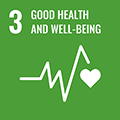Research at Queen’s has improved the quality of sexual healthcare provision for the general population in NI and for all prisoners in the region.
Research Challenge
IMPROVING SEXUAL HEALTHCARE
More than one million sexually transmitted infections (STIs) are acquired every day worldwide. STIs are especially prevalent among young sexually active people, 5% of whom are estimated to have an STI.
Chlamydia is the most common STI and while it can be easily treated, there are often few symptoms, so people do not realise they have it. If left untreated, it may cause pelvic inflammatory disease and infertility, as well as an increased vulnerability to acquiring HIV.
Early detection and treatment are much more cost effective than late detection and treatment in terms of reducing complications and onward transmission.
Our Approach
COLLABORATING WITH PARTNERS IN PRACTICE AND POLICY
Queen’s researchers conducted research on sexual healthcare provision for the general population, on prison sexual healthcare provision, and on the global evidence relating to engaging males in sexual healthcare.
To overcome the limited capacity of specialist hospital-based sexual healthcare, the Queen’s team implemented a cost-effective community-based model of research which expanded access to testing beyond the hospital setting. This community model of care was adopted by 49 of 54 GP practices in a Trust serving 20% of Northern Ireland’s population and led to improved health outcomes.
For the research conducted in prisons, the team contextualised and adapted the community model of care, with particular focus on male prisoners (97% of prison population is male), thereby addressing the sexual healthcare needs of one of society’s most under-served high-risk groups.
“The work was led by Professor Maria Lohan and her team, who were selected based on a competitive call for expressions of interest. Their selection was based on: their in-depth knowledge of the literature on masculinities and male engagement; their methodological expertise in systematic reviews; and their record of accomplishment of delivering policy relevant research briefs.”
- (Director of Sexual Reproductive Health, WHO)
What impact did it make?
IMPROVING ACCESS TO TESTING AND EDUCATIONAL SERVICES
The research has led to the re-organisation of community sexual healthcare provision through the training of nearly 250 healthcare professionals and consequent improved health outcomes for the general population.
Improving access to testing increases earlier detection of asymptomatic STIs, resulting in earlier treatment and preventing onward transmission and long-term sequelae. The largest impact in the early detection and treatment of STIs in NI is in relation to chlamydia. Initially as sexual healthcare expanded in GP practices, Trust data showed an increased chlamydia detection rate across GP Practices with minimal decrease in the hospital-based detection rate, reflecting a new and additional burden of previously undetected infection within the community.
Since 2017, diagnoses in GP Practices have overtaken the specialist sexual health service now making chlamydia testing a routine part of primary care. Crucially, this increases the capacity of specialist services to see more complex symptomatic patients.
The research has also resulted in the implementation of a new sexual healthcare service in prisons, associated health promotion strategy and educational service and consequent improved health outcomes for prisoners.
The research team’s long-standing specialist research expertise in the engagement of males in sexual and reproductive health led to a commission by the WHO to scientifically synthesize the global evidence to shape the WHO’s global policy agenda on engaging males in sexual and reproductive health and rights: Engaging men, addressing harmful masculinities to improve sexual and reproductive health and rights (who.int)
Maria Lohan and the Queen’s University team are now leading out the WHO Global Research Priority Setting Exercise on Masculinities and Sexual and Reproductive Health and Rights.
Our impact
Impact related to the UN Sustainable Development Goals
Learn more about Queen’s University’s commitment to nurturing a culture of sustainability and achieving the Sustainable Development Goals (SDGs) through research and education.










